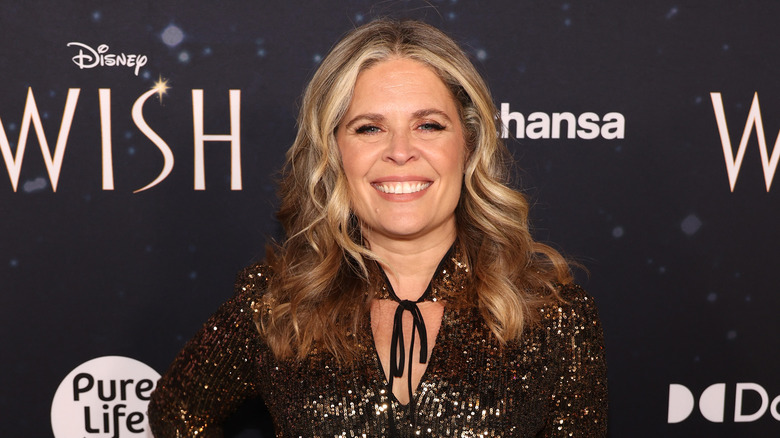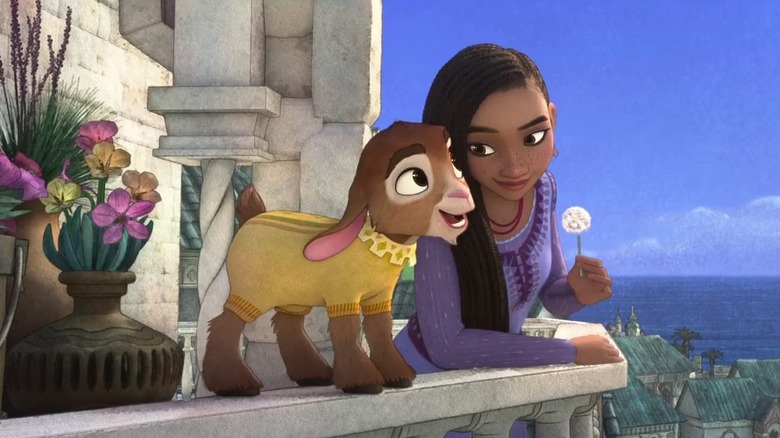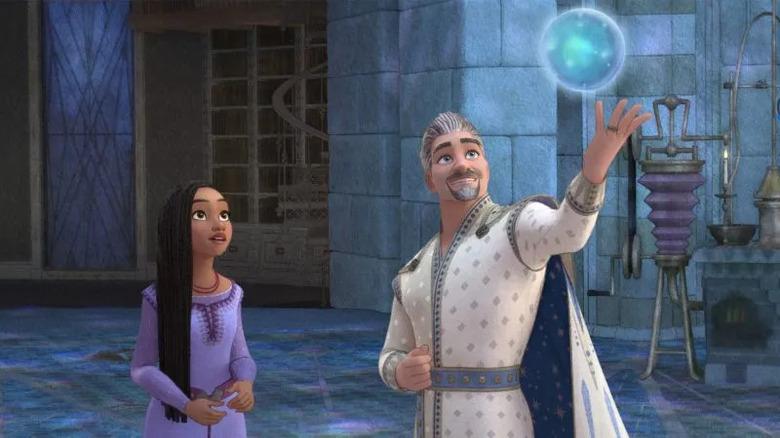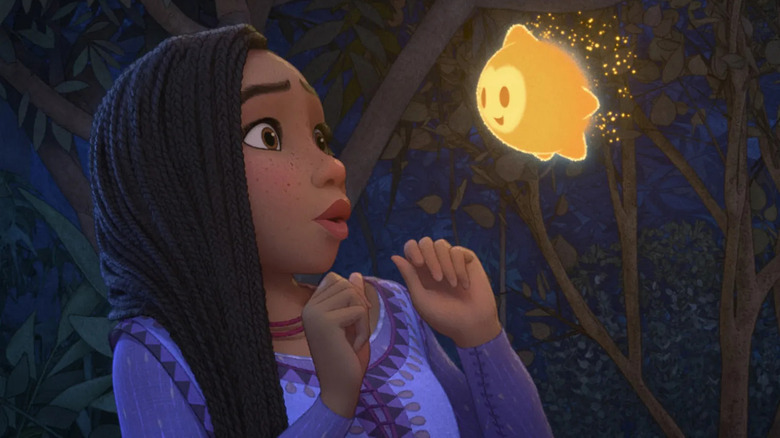The Legacy Of Disney's Wish Was Fun But 'Daunting' Says Writer-Producer Jennifer Lee - Exclusive Interview
Disney has continued finding intriguing ways to tell classic stories with new Disney princesses into the 21st century. After the monumental success of "Frozen," which is getting several new sequels, as well as "Moana" and "Encanto," Disney Animation Studios now presents an entirely new story with "Wish."
The animated film follows Asha (Ariana DeBose), who wants to make her dream — and the dreams of everyone else in the Kingdom of Rosas — come true. This puts her at odds with the malevolent King Magnifico (Chris Pine), who isn't so keen on giving people their hearts' desires. The idea of wishing upon a story has been with Disney since the beginning, so it's only appropriate that after 100 years of Disney Animation, the new movie centers on this theme and explores how everyone can make their dreams come true.
It's an ambitious story, but that's par the course for "Wish" writer Jennifer Lee, who's also the Chief Creative Officer of Disney Animation Studios. Looper had the chance to speak with her about "Wish" and what it means for both her and Disney as a whole. After all, "Wish" not only caps off 100 years of animation at Disney, but hopefully, it's also the start of another 100-year journey of amazing new films.
What Wish means for Disney Animation's 100th anniversary
I actually saw a Q&A you did 10 years ago when "Frozen" came out, and I was wondering if you could draw that throughline between how much Disney Animation has evolved going from "Frozen" to "Moana" to "Encanto" to now "Wish."
It has been incredible to be here for that journey, and hopefully what people see is we keep evolving as storytellers. We keep pushing ourselves into new places. What has been a goal is to celebrate more stories from around the world, and we're getting to do that. Then to come here to this place and start to ... Our legacy's built a lot on fairytales from previous works, but to start building our own original fairytales and pushing storytelling forward that way ... Those have been some of the most fun parts of this last decade — daunting, but fun.
What made "Wish" the perfect story to commemorate Disney Animation's 100th anniversary?
Sometimes, there's a simple word that you think is a simple concept — "to wish." We get it. But to wish is the key. A wish, especially when it's your purpose in your life ... Every character we've had in Disney, if they don't wish upon a star, or sing a "want" song, they set an aim that is really about their purpose and their drive. In some ways, as much as not every character has wished on a star, every character ... That thing that drives your heart is critical. To see how vulnerable you can be when you wish, how powerful you can be when you wish, how wishes can be destroyed, how wishes can surprise you, how wishes can change — all of those things were what I love, which is the messy meat of [it]. There's no one single thing. It's all complex, and at the core of it is us.
The fun new characters of Wish
Were there any particular inspirations for Asha? She follows in this trend of modern Disney princesses who are more interested in their family or friendships as opposed to pursuing romantic relationships.
There were a couple things with Asha, but the most important thing was the inspiration for Asha came from that awakening in life you have on the precipice of adulthood. You are hanging with your friends, you're with your family, everything's fine, and then you learn a truth about your world and you care so deeply about those around you. There's an innocence at that time of daring to think you can change it, but there's also a power because sometimes you can. That is within this character, and that was what drove Asha. Then, there's a little bit of Walt [Disney's] journey in there in terms of him having a wish, and here we are 100 years later with that.
One of my favorite aspects of the movie is King Magnifico, getting that classic Disney villain again with the villain song. Was that a conscious decision to be like, "We need to get a really good villain for this," because many modern Disney movies have more internal conflicts?
When we talked in the beginning about things we wanted to do, there were a lot of us going, "Oh, it'd be great to do a delicious Disney villain" — and yet very daunting. Once you've found the villain, it's the most fun thing to write in the world. Finding that villain is very overwhelming, especially when you think of our legacy. It's daunting.
But what was so fun about Magnifico was when we'd hear a lot in our story room about people wanting to understand him more. I'm like, "Okay, that's more modern." The storytelling's [like], "Don't just give me the arch-villain — I want to know why he is making his choices." Chris Pine brought that too, because he's like, "This is a smart guy. This is a guy who believes in his philosophy." To be able to go on the journey ... We open the movie with his face and him at his best. To get to draw that journey of, "He could have made different choices along the way," and to see the ones he made — once we locked in there, his scenes were the most fun to be a part of.
Wish celebrates the past and future of Disney
There are many Disney references in "Wish," as is usually the case. But was there a conscious decision to pay tribute to the history of Disney, or was it as you were writing the story? Were there opportunities like, "Oh, there's talking animals now. We can do something with that"?
It was a mix in the sense that in the beginning, we almost got a little worried that that would take over, so we pulled way back. But opportunities kept being there. Particularly, you mentioned the animals — the idea that we always tease it, like, "Where did all that come from, that animals can talk?" We know we have pixie dust, magic dust, things like that. This Star character [brings] that, and then we could enjoy ourselves.
We made sure we wrote something that foundationally was not based on the other films. But even some of the motifs, like the concept of mirrors, came over time because it almost felt like they just arrived there. You would start to see them in the boards — then you'd start to go, "He would do that." Some of those came about over time as if they were saying, "We're here, by the way." Others ... We would always say if it started to pull you out of the film, then that wasn't okay. But if it was additive and we were enjoying ourselves, why not?
"Wish" commemorates 100 years of Disney and draws influence from many films throughout the company's history. What do you hope the legacy of "Wish" will be for the next 100 years of Disney?
I went back to "Cinderella" over and over again when I was growing up, and I hope it's one of those films that whenever anyone needs to feel that they can have the courage to pursue their wish, they go back to this film. Whenever they're feeling like they're at a bump in the road, they can go back to this film. They can remember that you're not alone. There are helpers out there. It's okay that there are bumps in the road. There's failure and success. [I hope] that this film becomes that little light when they need it.
"Wish" releases in theaters on November 22.
This interview has been edited for clarity.



